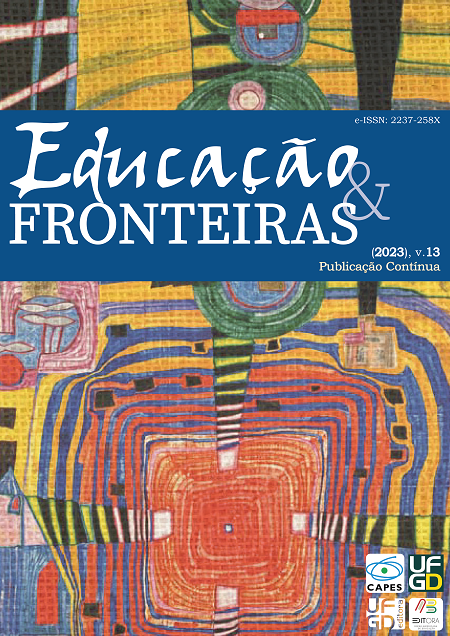Digital skills in basic education
The challenges of hybrid teaching
DOI:
https://doi.org/10.30612/eduf.v13i00.17778Keywords:
Digital Competencies, Continuing Education, Teachers, Hybrid TeachingAbstract
The adoption of hybrid teaching in many schools has forced teachers to develop digital skills for the integration of information and communication technologies (ICT). The aim of this research was to assess the level of acquisition and use of digital skills among high school teachers in a private education network. This is a quali-quantitative method that applied the questionnaire DigCompEdu check-in that was created to understand expectations, digital skills training needs, and challenges with hybrid teaching, to a group of high school teachers in the interior of the state of São Paulo. After administering the instrument, the results were analyzed using IBM SPSS Statistics® 22.0 software for descriptive and inferential statistical analysis of the questions. The results showed that teachers have a perception of their digital competence close to reality, but they self-assessed themselves at slightly higher levels than those revealed by the DigCompEdu check-in instrument.
Downloads
References
BENEDET, M. L. Competências Digitais: desafios e possibilidades no cotidiano dos professores da Educação Básica. 2020. Dissertação (Mestrado em Tecnologias da Informação e Comunicação) – Universidade Federal de Santa Catarina, Araranguá, SC, 2020.
BILBAO-AIASTUI, E.; ARRUTI, A.; MORILLO, R. C. A systematic literature review about the level of digital competences defined by DigCompEdu in higher education. Aula Abierta, v. 50, n. 4, p. 841-852, 20 dez. 2021. DOI: https://doi.org/10.17811/rifie.50.4.2021.841-850
CASTRO, F.; LUCAS, M. A importância das competências digitais dos professores na operacionalização das Orientações Curriculares para as TIC no 1.o CEB. Indagatio Didacrica, v. 14, n. 1, p. 99-115, 2022.
CHAABAN, Y.; MOLONEY, R. An Exploratory Study of the Factors Associated With Literacy Teachers’ Integration of Technology: A Study of Lebanese Schools. Journal of Digital Learning in Teacher Education, v. 32, n. 4, p. 128-139, 1 out. 2016. DOI: https://doi.org/10.1080/21532974.2016.1205461
CUADRADO, A. M. M.; SÁNCHEZ, L. P.; TORRE, M. J. de la. Las competencias digitales docentes en entornos universitarios basados en el Digcomp. Educar em Revista, v. 36, 2020. DOI: https://doi.org/10.1590/0104-4060.75866
DESSEN, M. A. et al. A ciência do desenvolvimento humano. Tendências atuais e perspectivas futuras. Porto Alegre: Artmed, 2005.
FERRARI, A.; PUNIE, Y.; BREČKO, B. N. DIGCOMP: A Framework for Developing and Understanding Digital Competence in Europe. [S. l.]: Fundacja ECCC, 2013.
FIGUEIRA, L. F.; DOROTEA, N. Competência digital, DigCompEdu Check-In como ferramenta diagnóstica de literacia digital para subsidiar formação de professores. Educ. Form., v. 7, p. e8332, 13 out. 2022. DOI: https://doi.org/10.25053/redufor.v7.e8332
FREITAS, C. L. de; CUNHA, D. A. da; MANFREDO, E. C. G. Práticas e formações de professores de matemática no ensino remoto. REAMEC - Rede Amazônica de Educação em Ciências e Matemática, v. 10, n. 1, e22012, 2 mar. 2022. DOI: https://doi.org/10.26571/reamec.v10i1.12985
GALLARDO-ECHENIQUE, E. E. et al. Digital Competence in the Knowledge Society. MERLOT Journal of Online Learning and Teaching, v. 10, n. 1, 2015.
HAIR, J. L. et al. Análise Multivariada de Dados. Porto Alegre: Bookman, 2005.
ILOMÄKI, L.; KANTOSALO, A.; LAKKALA, M. What is digital competence? 2011. Disponível em: http://linked.eun.org/web/guest/in-depth3. Acesso em: 10 ago. 2023.
JIMÉNEZ-HERNÁNDEZ, D. et al. Digital competence of future secondary school teachers: Differences according to gender, age, and branch of knowledge. Sustainability (Switzerland), v. 12, n. 22, p. 1–16, 2 nov. 2020. DOI: https://doi.org/10.3390/su12229473
LUCAS, M.; BEM-HAJA, P. Estudo sobre o nível de competências digitais dos docentes do ensino básico e secundário dos Agrupamentos de Escolas e das Escolas Não Agrupadas da rede pública de Portugal Continental. Aveiro, Portugal: Ministério da Educação, 2021. https://www.dge.mec.pt/sites/default/files/Noticias_documentos/estudo_sobre_o_nivel_de_competencias_digitais_dos_docentes_do_ensino_basico_e_secundario_dos_agrupamentos_de_escolas_e_das_escolas_nao_agrupadas_da_rede_publica_de_portugal_continental.pdf. Acesso em: 10 ago. 2023.
MINAYO, M. C. DE S.; SANCHES, O. Quantitativo-qualitativo: oposição ou Complementaridade? Caderno de Saúde Pública, v. 9, n. 3, p. 239–262, jul. 1993. DOI: https://doi.org/10.1590/S0102-311X1993000300002
PERRENOUD, P. Dez novas competências para ensinar: convite à viagem. Porto Alegre: Artmed, 2000.
RODRIGUES, N. F. et al. Os professores, as tecnologias e as competências digitais: proposições teóricas. In: Congresso Internacional TIC e Educação, 5., 2018. Anais[...]. [S. l.: s. n.], 2018.
SANTOS, G. M. DOS. Competência digital de educadores da educação infantil e anos iniciais do ensino fundamental: estudo no sistema municipal de ensino de marília-sp. Marília, SP: [s. n.], 2022.
SILVA, E.; LOUREIRO, M. J.; PISCHETOLA, M. Educação Competências digitais de professores do estado do Paraná (Brasil). Eduser: Revista de Educação, v. 11, n. 1, p. 2019. DOI: https://doi.org/10.36397/emteia.v11i2.248287
SOMYÜREK, S.; COŞKUN, B. K. Digital competence: Is it an innate talent of the new generation or an ability that must be developed? British Journal of Educational Technology, v. 44, n. 5, set. 2013. DOI: https://doi.org/10.1111/bjet.12044
SWEENEY, D. J.; ANDERSON, D. R.; CAM, J. D. Quantitative methods for business. 12. ed. Cincinnati: South Western College Publishing, 2013.
TARDIF, M.; LESSARD, C.; LAHAYA, L. Os professores face ao saber - esboço de uma problemática do saber docente. Teoria & Educação, Porto Alegre, v. 4, p. 214–233, 1991.
VÁZQUEZ-CANO, E.; MENESES, E. L.; GARCÍA-GARZÓN, E. Differences in basic digital competences between male and female university students of Social Sciences in Spain. International Journal of Educational Technology in Higher Education, v. 14, n. 1, 1 dez. 2017. DOI: https://doi.org/10.1186/s41239-017-0065-y
VÁZQUEZ-CANO, E.; MENGUAL-ANDRÉS, S.; ROIG-VILA, D. R. Análisis lexicométrico de la especificidad de la escritura digital del adolescente en WhatsApp. RLA. Revista de Lingüística Teórica y Aplicada, v. 53, n. 1, p. 83-105, 2015. DOI: https://doi.org/10.4067/S0718-48832015000100005
VIEIRA, P. R. DA C.; RIBAS, J. R. Análise Multivariada com o Uso do SPSS. Rio de Janeiro: Ciência Moderna, 2011.
VÓLQUEZ PÉREZ, J. A.; AMADOR ORTÍZ, C. M. Competencias digitales de docentes de nivel secundario de Santo Domingo: un estudio de caso. RIDE Revista Iberoamericana para la Investigación y el Desarrollo Educativo, v. 11, n. 21, 23 jul. 2020. DOI: https://doi.org/10.23913/ride.v11i21.702
Published
How to Cite
Issue
Section
License
Copyright (c) 2023 Educação e Fronteiras

This work is licensed under a Creative Commons Attribution-NonCommercial 4.0 International License.









